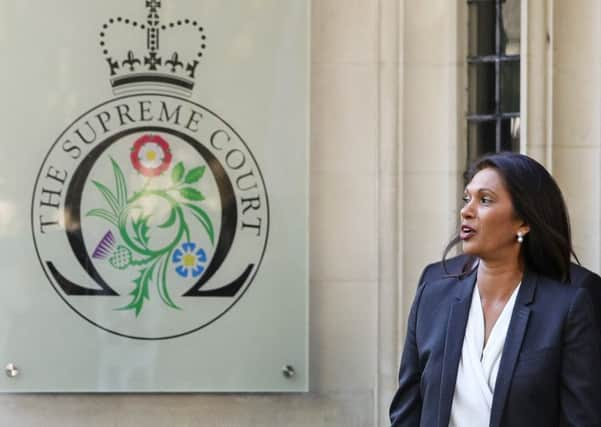Parliament may stay shut even if Boris Johnson loses legal case


In legal argument and written submissions set out on the final day of the landmark hearing into the suspension of parliament, the government’s lawyers said MPs may not be recalled even if Mr Johnson is found to have broken the law.
It came as lawyers for former Prime Minister John Major accused the government having “misled” the public in statements about the reasons for prorogation.
Advertisement
Hide AdAdvertisement
Hide AdAt the conclusion of the three day hearing, Supreme Court president Lady Hale said a judgement was likely to be returned early next week.
Senior Downing Street figures are understood to be increasingly worried about the possibility of losing the case. Yesterday the Prime Minister declined to rule out suspending Parliament again if the Supreme Court rules against him.
“I have the greatest respect for the judiciary in this country,” Mr Johnson said.
“The best thing I can say at the moment whilst their deliberations are continuing… I will wait to see what transpires.”
Documents submitted to the court and published yesterday reveal three possible approaches the government could take in the event the suspension is ruled unlawful - two of which could see the Prime Minister make a fresh decision to prorogue Parliament.
The other outcome could see the court order Parliament to be recalled, but Mr Johnson’s lawyers urged the judges to consider the “very serious practical consequences” involved in this option, as it would require a new Queen’s Speech and State Opening of Parliament.
Lawyers for Mr Johnson’s opponents said Parliament should meet “urgently” after the ruling to decide what to do in the event the prorogation is declared “null” by the court.
The ruling could come at a sensitive time for the Prime Minister as he is due to make his debut appearance at the United Nations General Assembly in New York.
Advertisement
Hide AdAdvertisement
Hide AdMr Johnson is scheduled to be in the United States from Monday to Wednesday and is expected to use the trip to hold meetings with key players in the Brexit process, including German leader Angela Merkel and European Council president Donald Tusk.
The timing could also prove difficult for Labour MPs attending the party’s annual conference in Brighton.
On the final day of legal arguments, lawyers acting for Mr Major set out the former Prime Minister’s belief that the decision to suspend parliament was motivated by a desire to avoid scrutiny, amid the continuing crisis over leaving the EU.
Mr Major’s QC Lord Garnier said the intervention was “nothing to do with the arguments for or against Brexit”.
But in written submissions which were also provided to the court, Lord Garnier said the former prime minister is of the view the “inference was inescapable” that Mr Johnson’s decision was “motivated by his political interest in ensuring that there was no activity in Parliament during the period leading up to the EU Council summit on October 17 and 18”.
Lord Garnier, who served as solicitor general under David Cameron, told the court that “the power of prorogation subverts the possibility of control by political means.
“Its effect is to deprive Parliament of a voice throughout the period of the prorogation... to prevent Parliament from discharging its role during a time-critical period, there is no possibility of meaningful political control of that decision until after the damage has been done.”
Lord Garnier said it remains “genuinely unclear” whether Mr Johnson disputes that he was motivated by political interest because no witness statements have been provided.
Advertisement
Hide AdAdvertisement
Hide AdLord Pannick QC, acting for the campaigner Gina Miller who lodged one of the two appeals being considered by the Supreme Court, told judges that “in these unusual and difficult circumstances” they should “let Parliament sort out the problem”.
Summing up the government’s case, Lord Keen of Elie said prorogation was “a matter between the executive and Parliament”, adding that if Parliament “takes exception” to actions of the executive “they have the tools available” through a motion of no confidence.
He said: “How in the context of that political minefield is the court to opine on the issue of purpose or improper purpose, or legitimate political purpose or illegitimate political purpose? How are these concepts to be defined and applied in this context?
“In my respectful submission, the applicants and the petitioners are inviting the court into forbidden territory and into what is essentially a minefield, an ill-defined minefield.”
The panel of 11 justices also heard submissions on behalf of the Welsh and Scottish governments and Northern Irish victims’ campaigner Raymond McCord.